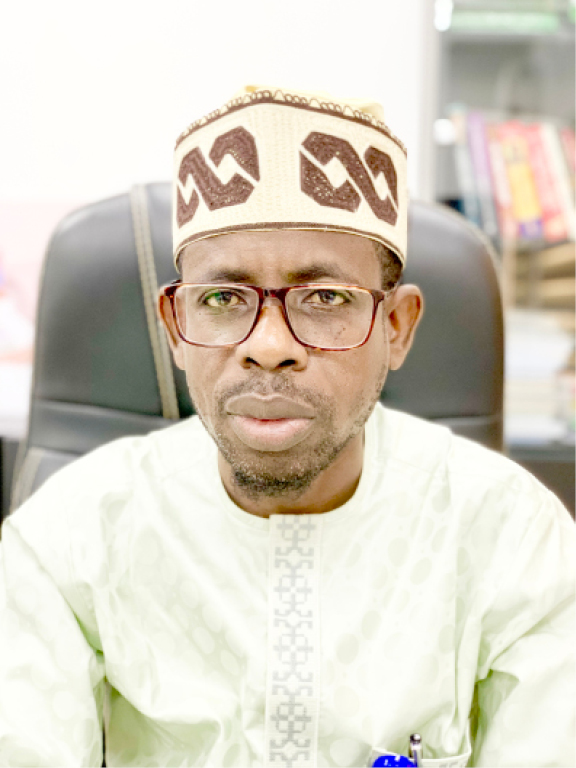Dr Kabiru Usman Hassan is the Director-General of the Gombe Geographic Information Systems (GOGIS). In this interview, he speaks on how to address building collapse in the country, the reforms introduced by the agency that enabled it to generate over N1.8bn in less than two years and other issues.
Building collapse has become endemic in Nigeria. How do you think land administration can be used to prevent that?
Building collapse happens because of the indiscipline of professionals who are in civil service. The professionals use to compromise when giving building approval to developers.
Let me give an example with the Development Control Department in Abuja. In Development Control, after submission for your building plan, maybe you are trying to build an eight-storey structure; you must have an intensive structural work into it, and you must have a strong supervision team within the government and the developer.
But sometimes the developer will submit his drawing; the drawing must pass through the vetting room, where all the professionals gather: town planner, architect, quantity surveyor, builder, electrical engineer and mechanical engineer, etc.
What we expect is that each of the professionals should try and vet his own aspect. Let’s say a town planner must check his planning aspect very well, an architect should check his architectural part very well without any compromise up to the end.
But sometimes, let’s take structural engineering; you know you are to use 10mm for iron, then you use 5mm for iron. You should be called in order to go and make sure you change the design with 10mm or you find your way and see the officer-in-charge, settle him, then he’ll allow your work to pass. And apart from that, when your drawing is approved, you go to the site. Working on the site, they must be strictly vigilant in each stage of the design.
What I mean is, a foundation that will carry a load of a 10-storey building is different from the foundation that will carry a 25-storey building, and it is different from the foundation that will carry a five-storey building. But sometimes because of corruption and compromise by the officers, they will allow you to have substandard iron materials, building materials, even the blocks, even the iron rods. That is when the problem will start emanating.
How can regulatory agencies play roles in checking these vices?
Government should empower the regulatory agencies and make sure they are well-funded to do their work as expected of them. There must be reward and punishment for those that err and those that do well. But above all, the regulatory agencies should make sure that they put the fear of God in their professional and public service work. Without the fear of God, they will do whatever they want to do. That’s the only thing. Just fear God and forget about the material things and do due diligence on the activities.
Can changing land use contribute to the problem?
Yes, for instance you were given approval to build a bungalow but you went ahead and built a five-storey building, let’s say in a flooded area where the strength of the soil cannot carry the load of even a two-storey building. That is when building collapse happens. And you know this thing is somehow natural and human indiscipline.
How can you compare land administration in Gombe State and other states like Kaduna and Kano, being major cities in Northern Nigeria?
In Gombe, we are growing, and Alhamdulillah, so far so good, people have started identifying what we are doing in terms of reforms. We have transformed land administration. We can say 95 per cent; and we can compete with Kaduna, we can compete with Abuja, we can compete with Lagos, Port Harcourt, Makurdi and other big cities.
Gombe and Kano in terms of land administration are incomparable, because in terms of ICT facilities, we have international ICT gadgets, so you cannot even compare us with Kano. The modus operandi of our operation here in Gombe is far more advanced than in Kano.
What are the challenges in Kano?
There are problems because where you are supposed to have land for a cemetery, you allocate it for shops, where you are to allocate for Eid ground you allocate it for shops, where you are to allocate it for residential areas you allocate it for events.
So, it causes a lot of confusion in the city. The city has not had a view of the city because of this distortion, because of this land use changes.
Recently, the Gombe State Government flagged off the construction of 550 houses, tagged “Shongo Garden Estate”, what is the idea behind the project?
The idea behind the project is that you know we have housing problems all over the world, China, India; and Nigeria is the third in terms of housing problems. We are trying to see how we can have a National Housing Fund where each and every citizen of Nigeria can be able to access housing loans.
Are you trying to bridge the deficit of housing in Gombe?
Yes. That is why we at the state level were able to have some counterpart funds from Family Homes with the state government. We are trying to have 550 houses there. Not only there, we have another 200 in Dadin-Kowa town near the Muhammadu Buhari Industrial Estate, but we are starting with the 550 and we have a total of 244 hectares in the layout. Out of the 244 hectares, we were able to earmark 15 hectares for this 550 houses. And we have 10 hectares down there for the North East Development Commission (NEDC). And we are going to allocate the remaining land to citizens of Gombe State in order to reduce the housing deficit in the state.
We have noticed that there are high tension wires of the Transmission Company of Nigeria (TCN) on the land, coupled with reports that the land belonged to NNPC, can you explain?
There are high tension wires. We were able to provide the standard setbacks which were given by the TCN; that is 50 metres. Let’s say this is the high tension here. So you must have 25 metres by this side, 25 metres by this side before you reach the plot. And the land, yes, it belonged to NNPC, but we revoked the land. Why we revoked the land was because for over two decades they refused to pay the ground rent which is allowed by law. Anybody that has land must be paying rent to the government every year, but they refused to pay and it accumulated to about N850m. We followed all the guidelines, we followed all the procedures in order for them to pay this money into our government account. But it proved abortive so there was no option than to revoke the land and allocate it to individuals who are interested in developing the land so that we can increase our Internally Generated Revenue (IGR).
If you look at the land, it is between two communities. We have Shongo Sarkin Yaki and the Abubakar Hashidu Housing Estate. This land, as soon as we start giving out the allocation, within two to three years the development will come up.
You have been the DG of GOGIS for about four years now, what reforms have you introduced in the agency?
One of the reforms is to scatter the Ministry of Land and Survey. What I mean by scattering the ministry is that those who have been dealing badly with indigenes of Gombe in terms of double allocation, selling lands of orphans, people trying to manipulate your files and give it out to themselves and sell it. We try to sanitise that issue by trying to move from analogue to digital in order to stop malpractices in land administration. And that has been producing results. For instance, in the last two years we have generated over N1.8bn as revenue to the state.





